|
Limitar tu búsqueda
[+–] Compilador o editor
- Abrantes Pêgo, Raquel (2)
- Aguilera, Nelly (6)
- Alvarez García, Ma. del Cármen (7)
- Anguiano Cárdenas, Rosa del Cármen (1)
- Castaleda Zainos, Marcos (1)
- Comisión Americana Jurídico Social (3)
- Del Valle Muñoz, Alejandro (1)
- Delgado Izazola, Ana Luz (2)
- Durán, Luis (5)
- Díaz Alfaro, Salomón (1)
- García Castelán, Alfonso (1)
- Garro, Nora (1)
- Giles Valdés, Rafael (1)
- González Rojas, Bertha Alicia (1)
- Hernández Sánchez, José Antonio (1)
- Instituto Hondureño de Seguridad Social (1)
- Jiménez Durán, Octavio (1)
- Linares Tirado, Rebeca (1)
- Madrazo Navarro, Mario (2)
- Martínez, Gabriel (3)
- Matute de Díaz, Zoila (1)
- Meléndez, Jorge (1)
- Méndez Suazo, Elmer (1)
- Palmero Zilveti, Olga (2)
- Ponce Aguilar, Luisa (1)
- Reyes Godelmann, Iker (2)
- Ruezga Barba, Antonio (7)
- Sobrevilla, Luis A. (1)
- Suárez, Rosa María (1)
- Svenson, Hans (1)
- Tovar Lugo, Rodolfo (1)
- Treviño García Manzo, Norberto (1)
- Valencia, Anel (1)
- Valle González, Armando (1)
- Velázquez Franco, Emanuel (1)
[+–] Editorial
[+–] Fecha
[+–] Formato
[+–] Idioma
[+–] Tipo de documento
[+–] Tipo de recurso
[+–] Classification
|

|
|
Análisis de la factibilidad de construir un sistema integrado de salud: implicaciones financieras y distributivas
El documento muestra proyecciones de gasto y de incidencia distributiva de un Sistema Integrado de Salud en tres escenarios básicos: status quo, un esquema de dos pilares (financiamiento de impuestos generales y gasto privado) y en un escenario de tres pilares (financiamiento de impuestos generales, seguridad social y gasto privado). El estudio, al presentar estas simulaciones, permite enriquecer...
|
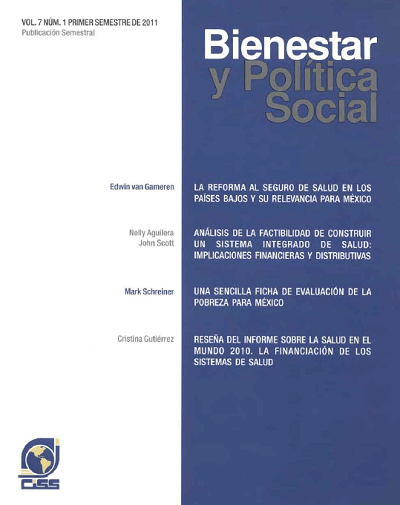
|
|
|
|

|
|
La reforma al seguro de salud en los países bajos y su relevancia para México
Alrededor del mundo se observan dos versiones de la organización de los seguros de salud; la seguridad social basada en el empleo, y los servicios nacionales de salud. En Latinoamérica regularmente se usa la primera, pero se está lejos de lograr la cobertura universal. En los Países Bajos encontramos una peculiar mezcla de obligaciones públicas y responsabilidades privadas. La cobertura universal...
|
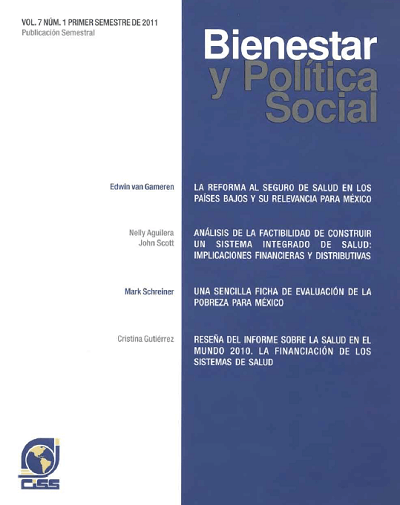
|
|
|
|

|
|
Reseña del libro Violence and social orders: A conceptual framework for interpreting recorded human history, por Douglas C. North, John Joseph Wallis y Barry R. Weingast
¿Por qué difieren las sociedades en cuanto a niveles de violencia? Esta es la pregunta que abordan North, Wallis y Weingast. Para obtener una respuesta, deben desarrollar una elaborada teoría sobre la forma en la cual las personas y las organizaciones que componen un grupo de seres humanos, renuncian voluntariamente a actuar de manera violenta a cambio de participar en una sociedad que ofrezca...
|
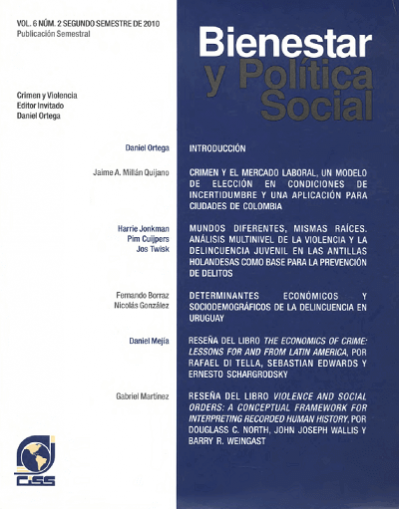
|
|
|
|

|
|
Reseña del libro The economics of crime: Lessons for and from Latin America, por Rafael Di Tella, Sebastian Edwards y Ernesto Schargrodsky
Este libro contribuye de forma importante al estudio de la delincuencia y la violencia en América Latina, así como al debate sobre lo que realmente funciona para reducir los índices delictivos (¿y a qué costo?). Como lo sugiere acertadamente su título, este libro recopila los estudios de economistas latinoamericanos sobre los factores determinantes y las consecuencias de la delincuencia, así como...
|
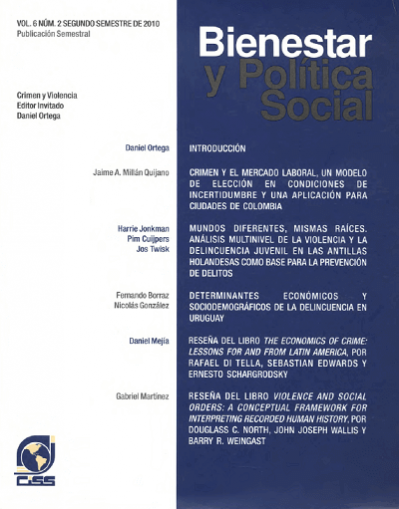
|
|
|
|

|
|
Relación del capital social e indicadores de salud en México
Este trabajo analiza la relación entre los tipos de capital social y el acceso a servicios de salud en México. Para ello, se valida la información de acceso a salud de la ENCASU 2006 y ENCAS 2011 con la información de la ENSANUT 2006 y 2012, encontrando consistencia en los indicadores. Se realiza un análisis estadístico de la distribución del capital social y de los indicadores de salud, por...
|
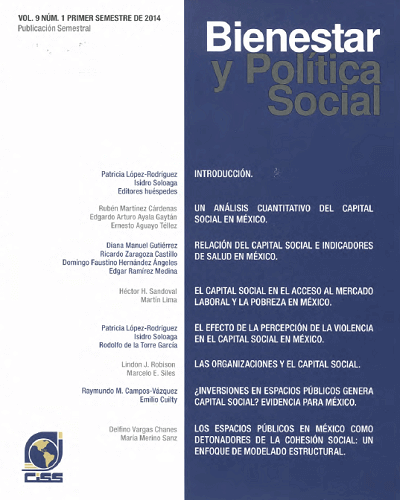
|
|
|
|

|
|
El efecto de la percepción de la violencia en el capital social en México
El incremento en la violencia que presenta México con consecuencias en la ruptura del tejido social y en variables económicas clave nos llevan a analizar el efecto del cambio en la percepción de la violencia en el cambio en el capital social –como asociativismo- entre el 2006 y el 2011, periodo en el que se inició la política contra la violencia y el crimen organizado en México (2006-2012). Se...
|
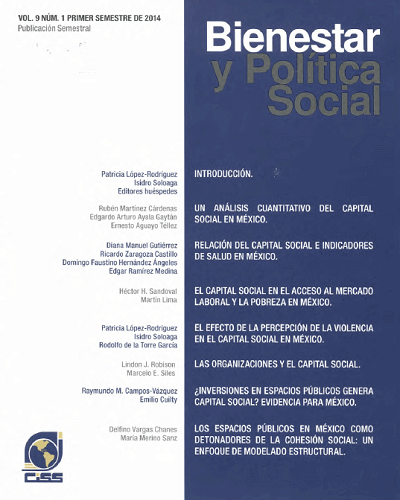
|
|
|
|

|
|
Unemployment insurance in Chile: a new model of income support for unemployed workers
This paper describes the Chilean experience concerning the implementation of a new unemployment insurance (UI) program. The use of individual savings accounts and private management are essential elements. In addition, a redistributive fund (Common Fund) helps workers pool risks, distributing resources from employed to unemployed workers and from stable firms to workers with low incomes and...
|
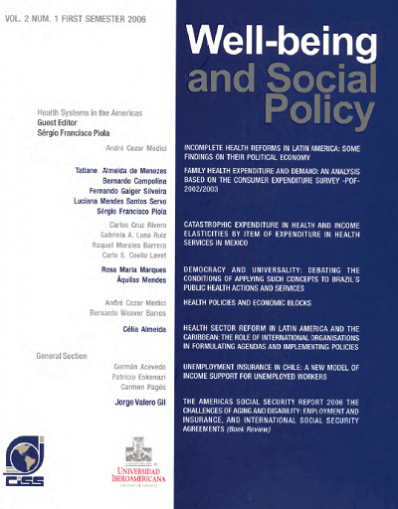
|
|
|
|

|
|
Provisional and welfare inclusion in Brazil (1988-2005): scope and limits
This paper analyses the influence of new rights derived from the Social Security System in Brazil after the Federal Constitution (1988). At least, three different and independent forces determinate the arrangements in social security policies: 1) the new social rights created by constitutional rules in response to social pressure; 2) the decrease of employment and wages in salaried jobs imposed...
|
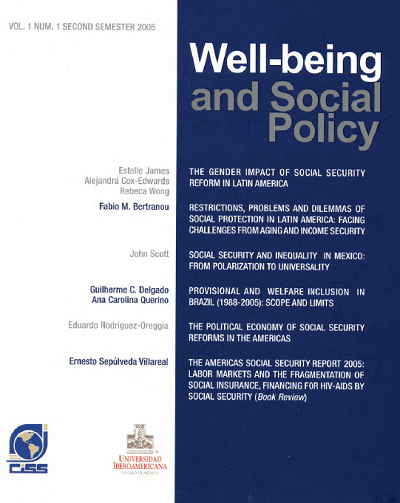
|
|
|
|

|
|
Health sector reform in Latin America and the Caribbean: the role of international organisations in formulating agendas and implementing policies
This article examines health sector reforms in Latin America and the Caribbean to discuss the ideological, theoretical, and conceptual elements that inform the reform agenda and the models put forward for attaining greater equity in the region’s countries. Its starting assumption is that the relevant literature generally neglects the economic, social, and political aspects underlying the...
|
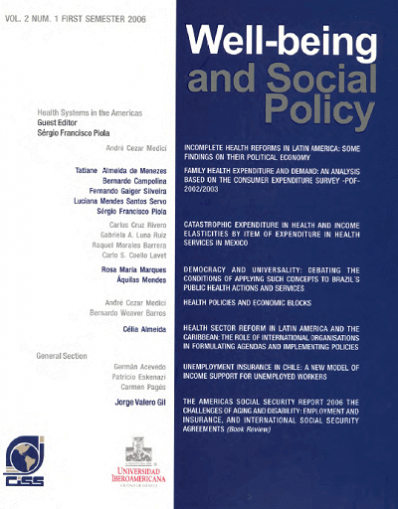
|
|
|
|

|
|
Health policies and economic blocks
This paper analyzes the roles of health goods and services markets within the regional integration process. It is a known fact that the consolidation of integrated markets is slower regarding social goods and services (as health and education) than among other goods and services (e.g. durable consumption goods). The paper discusses the nature of the health sector and its global dimension, showing...
|
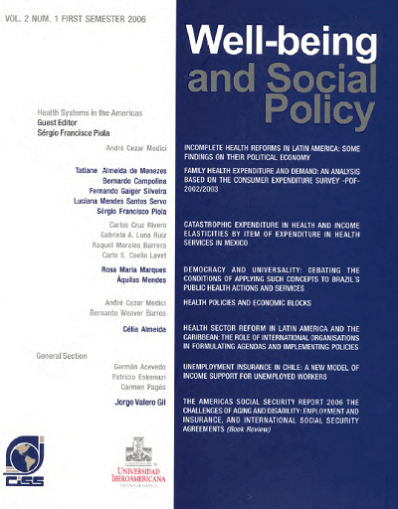
|
|
|
|

|
|
Democracy and universality: debating the conditions of applying such concepts to Brazil's public health actions and services
This paper reviews the determinants and conditionalities of the process of universalizing public health in developed countries, notably the European ones, and in Brazil, and is aimed at highlighting their differences. The first part discloses the main interpretations on the constructing of the Welfare State, emphasizing the characteristics of that historical moment and its articulation with...
|
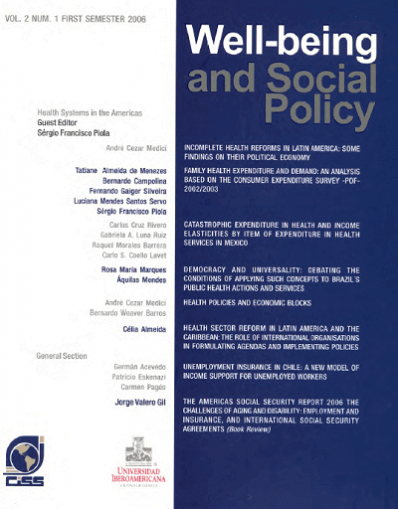
|
|
|
|

|
|
Catastrophic expenditure in health and income elasticities by item of expenditure in health services in Mexico
The objective of this article is to put in economic perspective the expenditure in health within the pattern of family expenditure of the Mexican households. Information of the National Survey on Income Expenditure of Households (ENIGH) of Mexico of 2004 is analyzed on: structure of the expenditure of the households, expenditure in health and income-expenditure elasticities in health; by...
|
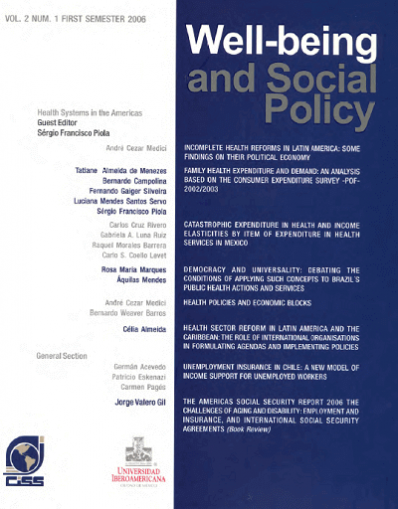
|
|
|
|

|
|
Family health expanditure and demand: an analysis based on the consumer expenditure survey - POF - 2002/2003
This paper aims at analyzing healthcare expenditure and demand of families, by estimating income-elasticity and price-elasticity for ten groups of products using the so-called model Linear Almost Ideal Demand System (LAIDS). The 2002/03 consumer expenditure surveys (POF) of the Fundação Instituto Brasileiro de Geografia e Estatística – FIBGE (Brazilian census bureau) are used, providing extremely...
|
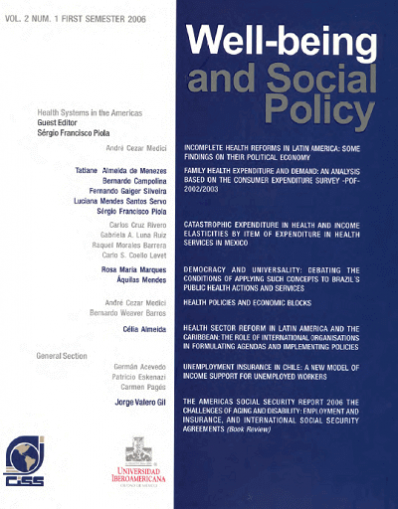
|
|
|
|

|
|
Incomplete health reforms in Latin America: some findings on their political economy
This paper raises the point that only few health reforms implemented in Latin American countries modified the existing health systems in order to fix the problems brought by the institutional fragmentation typical of this sector. A great part of these reforms did not implemented the necessary measures to improve coordination among health systems in the prevailing pluralistic model and besides,...
|
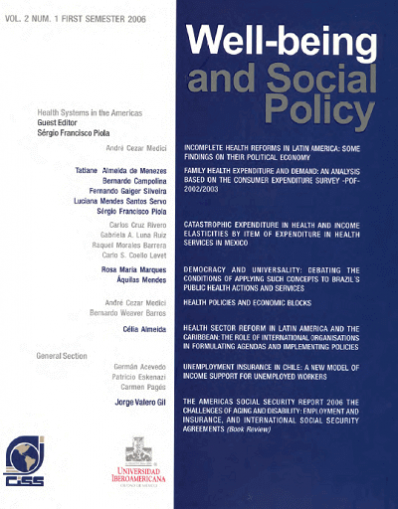
|
|
|
|

|
|
The Americas Social Security Report 2005: labor markets and the fragmentation of social insurance, financing for HIV-AIDS by social security (Book review)
The Americas Social Security Report 2005, published by the CISS, gathers the contributions, opinions, and comments of more than 30 social security specialists from different countries in the American continent, as well as the review of the most recent literature on this matter. The purpose is to present, to specialized public and to laymen, a detailed, analytic, and updated report of the...
|
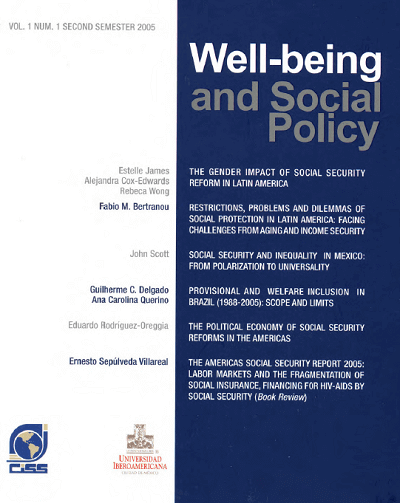
|
|
|
|

|
|
The political economy of social security reforms in the Americas
This paper analyses the factors affecting the decision to apply a reform (parametric and structural) in the Americas, which may hold a specific set of conditions, i.e. a sui generis political system and a high degree of economic openness, among others. Economic freedom is relevant in the case of structural reforms, while results for the share of older population are not conclusive. It may be that...
|
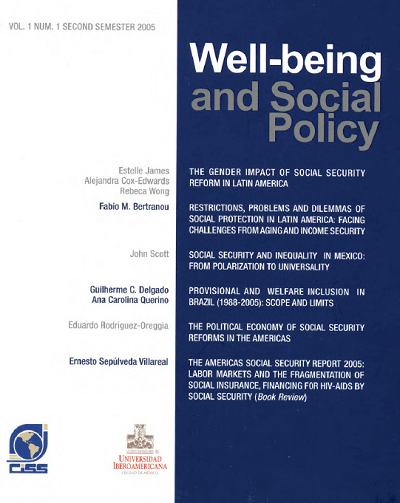
|
|
|
|

|
|
Social security and inequality in Mexico: from polarization to universality
The article documents the failure of social security in Mexico as an instrument of social protection and evaluates possible reform strategies. It analyses the truncated coverage of these systems for the most vulnerable, the regressive incidence and horizontal inequities of public social security subsidies, and the consequences for old-age poverty and inequalities in basic health opportunities. It...
|
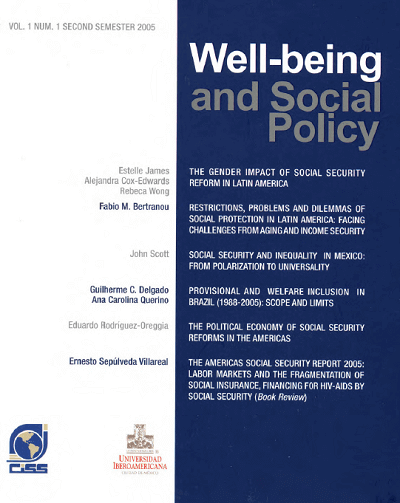
|
|
|
|

|
|
Las organizaciones y el capital social
Una organización es un grupo de personas que reúnan requisitos de membresía establecidos y cuya forma y función son generalmente reconocidos. Los requisitos para ser miembro de una organización pueden basarse en rasgos heredados o adquiridos. Las organizaciones existen porque proporcionan un entorno en el que los miembros de rasgos similares pueden satisfacer sus necesidades físicas y...
|
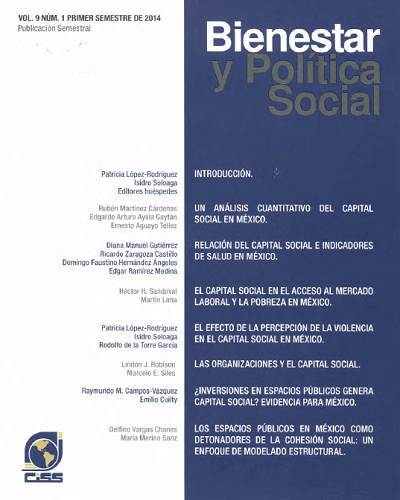
|
|
|
|

|
|
Restrictions, problems and dilemmas of social provision in Latin America: facing challenges from aging and income inequality
This paper discusses the main restrictions, problems and dilemmas that social provision faces in Latin America in a context of demographic changes and low achievements in the economic performance, particularly in the labor market. It is proposed the need to adapt the general social provision matrix as function of priorities and restrictions set by financing access. Due to the limited labor...
|
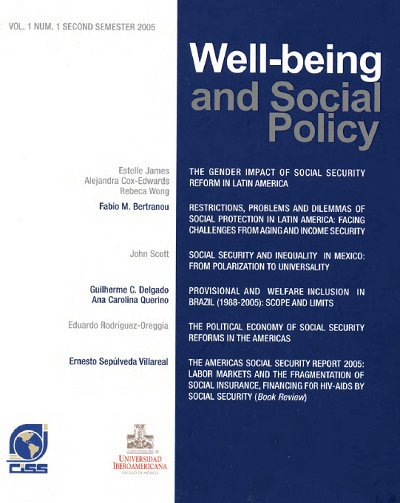
|
|
|
|

|
|
The gender impact of social security reform in Latin America
Recent multi-pillar pension reforms tighten the link between payroll contributions and benefits, leading critics to argue that they will hurt women, who have less continuous employment and earn lower wages than men. However, these reforms also remove distortions and target redistributions to low earners, which help women. This paper tests these conflicting claims in the case of three Latin...
|
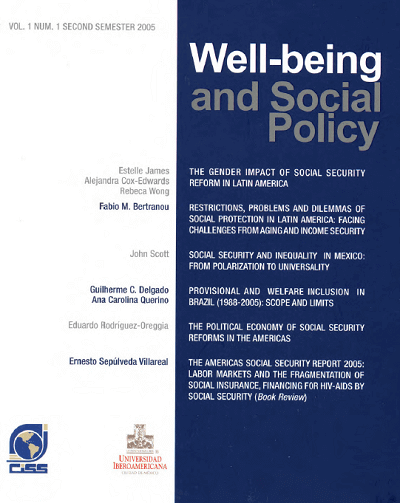
|
|
|
|
|